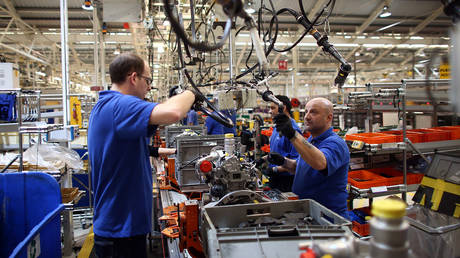
Iconic US carmaker to axe 14% of workforce in Europe
Ford has said it will lay off 4,000 employees in the continent amid weak EV sales and economic headwinds
US car manufacturer Ford has said it will lay off 4,000 of its workforce in Europe, becoming the latest automaker to try to cut costs amid weak electric vehicle (EV) sales and competition from China.
The job cuts represent about 14% of Ford’s 28,000 workforce in Europe and around 2.3% of its total workforce of 174,000, and will be completed by the end of 2027, the company said on Wednesday. The bulk of the layoffs will take place in Germany, where 2,900 positions are under threat, and in Britain, with an expected 800 jobs to be cut.
The US carmaker will be the latest after Nissan, Stellantis, and GM to resort to the drastic step in a bid to cut costs as the automotive sector faces challenges, including weak EV sales. Ford announced massive layoffs last year as part of an austerity plan, saying it will cut jobs as it shifts to EV production, which requires less personnel.
Dave Johnston, Ford’s European vice president for transformation and partnerships, said in a statement that it is “critical to take difficult but decisive action to ensure Ford’s future competitiveness in Europe.”
Read more
Thousands in Brussels protest German car giant’s job cuts
“The transformation is particularly intense in Europe where automakers face significant competitive and economic headwinds while also tackling a misalignment between CO2 regulations and consumer demand for electrified vehicles,” the statement said.
The measure will deal a heavy blow to the EU’s top economy, Germany, where the bloc’s biggest carmaker – Volkswagen – earlier announced that it would consider plant closures or layoffs for the first time in its 87-year history.
The development comes as EU automakers are facing their worst months since the Covid-19 pandemic. Car sales within the bloc have fallen by 200,000 vehicles in the first eight months of 2024 compared to the same period last year, according to the Center for Automotive Research.
Earlier this year, thousands of demonstrators stormed Brussels to protest Volkswagen’s plans to shut down the Audi facility in the Belgian capital.
Germany’s automotive sector has been in decline over the past five years losing its competitiveness amid budgetary restrictions as well as the country’s refusal to import cheap Russian energy.
